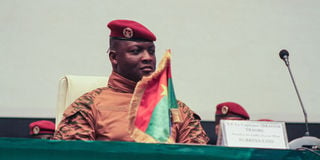Burkina Faso junta speaks of coup plot after criticism over jihadi massacre

Burkina Faso's junta leader Captain Ibrahim Traore attends the first ordinary summit of heads of state and governments of the Alliance of Sahel States (AES) in Niamey, Niger July 6, 2024.
Dakar,
Burkina Faso's junta said it had uncovered an international plot to overthrow it and which included the massacre in August of hundreds of civilians by Islamist insurgents.
Some critics and analysts however said the junta's statement was an attempt to deflect blame for the killings and security situation in the country.
The junta came to power in a 2022 coup pledging to beat back jihadists who have ravaged the landlocked West African country for years. But instead violence has increased, leaving the regime worried about popular discontent, its critics and analysts say.
In the worst of a recent surge of attacks, insurgents affiliated with al Qaeda slaughtered hundreds of people who were digging defensive trenches around the town of Barsalogho on August 24, prompting an unusually open outpouring of anger and grief.
The junta has said little about the massacre, ignoring calls for the military to take responsibility for having ordered civilians to dig trenches without protection in an area rife with jihadist activity.
In a lengthy statement late on Monday, interim security minister Mahamadou Sana said the Barsalogho attack was a first step meant to create chaos and facilitate the infiltration of "several terrorist groups" into the capital Ouagadougou.
The statement accused opponents of the junta, backed by Western intelligence and European mercenaries, of a vast, multi-pronged destabilisation plot orchestrated from other countries including Ivory Coast, Ghana and Nigeria.
The junta did not provide any evidence to back up its accusations.
One of the named suspects, investigative journalist and junta critic Newton Ahmed Barry, rejected all the accusations on Facebook.
"After Barsalogho, they needed to find a diversion given the scale of the tragedy," he posted.
Several civil society sources and analysts told Reuters they agreed with Barry's interpretation, but did not wish to be named because they feared retaliation against themselves or their relatives from the authoritarian junta.
"This is a vulgar attempt to deflect responsibility for what happened, to throw the blame on the opposition and paint them as JNIM accomplices," said one analyst, referring to the Al Qaeda-affiliated group that claimed responsibility for Barsalogho.
The junta did not immediately respond to a request for comment.
Reuters has documented how the regime has suppressed opposition by abducting, torturing and forcefully conscripting its critics.





